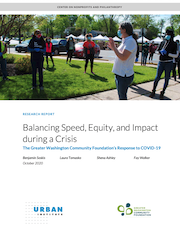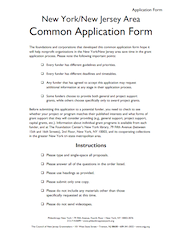Site Search
- resource provided by the Forum Network Knowledgebase.
Search Tip: Search with " " to find exact matches.
Despite a field replete with research, analysis, recommended policies and practices — not to mention an abundance of educational programs and frameworks for grantmaking to diverse communities — philanthropic leaders have been slow to advance these values in their foundations. Philanthropy Northwest (PNW) wondered: what is getting in the way? Why are good intentions, buttressed with theory and practical advice, not achieving better results on measures of diversity, equity and inclusion?
With the support of the D5 Coalition, PNW began a year-long study to explore these questions. The study was divided into two parts. They began with personal interviews of 23 philanthropic leaders in the Pacific Northwest. In order to better understand how these organizations incorporated diversity, equity, and inclusion into their work and workplaces, they collected baseline information about their staff composition, leadership styles, and organizational practices/policies.
This report details their findings. It includes an in-depth look at the peer cohort model, in which ten foundation leaders met regularly to discuss these issues and support each other in advancing their own leadership. It also includes practical lessons about shifting organizational cultures towards greater diversity, equity and inclusion — lessons drawn directly from the experiences of peer cohort leaders.
PNW presented this work in a webinar hosted by the D5 Coalition. The webinar recording and slides are below.
As a follow-up to our Giving in Indiana study (released earlier this year), Indiana Philanthropy Alliance is pleased to share this snapshot of promising practices for advancing diversity, equity and inclusion in Indiana philanthropy. Throughout our state, foundations are incorporating the values of diversity, equity and inclusion (DEI) into their organizational cultures; engaging diverse populations as staff, board members, donors, and grantees; and working to make their communities more welcoming places. This report is an effort to capture a sampling of these endeavors.
Nonprofit Finance Fund's Annual Survey chronicles the challenges facing the nonprofit sector and calls out some of the targeted investments we can start to agree on as a society to salvage the investment we have collectively made in our social infrastructure. We believe that a coordinated intervention now will not only better prepare us for inevitable future economic crises; it can lead to a happier, healthier community for us all.

The COVID-19 public health and economic crisis has changed our world as we know it. As employers moved to remote work, schools shifted to distance learning, and businesses closed completely, it became clear that the impact on residents, nonprofits, and businesses was far greater than anyone could have ever imagined.
In response to the growing and evolving needs of our region, the Greater Washington Community Foundation established the COVID-19 Emergency Response Fund to raise and rapidly deploy funding to local nonprofits providing food, shelter, educational supports, and other critical services.
From the beginning our goal was clear: to address the immediate needs and reach adversely affected communities, particularly low-income households and communities of color. We know all too well that in a crisis like this, these marginalized communities are hit the hardest, and often take the longest to recover.
In times of crises, The Community Foundation is our region’s philanthropic first responder, bringing together individuals and families, philanthropic peers, corporate partners, and local government advisors to address community issues. Building on our rich history of emergency response work, we grounded our COVID-19 response efforts in a similar coordinated approach.
This report chronicles the steps taken, under immense pressure, to develop a coordinated emergency response effort to support a broad range of needs across the region. Once again this effort has demonstrated that working in partnership and close collaboration with our philanthropic peers and local government advisors is an effective way to manage a response to both urgent and longer-term needs.
This paper explores community democracy as a cultural choice and a potential organizing system for philanthropy using stories that demonstrate its principles and practices, primarily growing from the experience of northern California communities. This experience offers a framework of principles and a beginning set of conclusions about how philanthropy can develop productive partnerships from the perspective of a place-based, community democracy.

